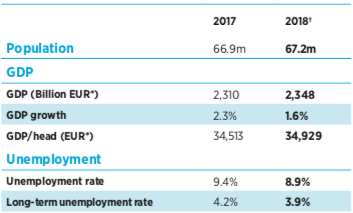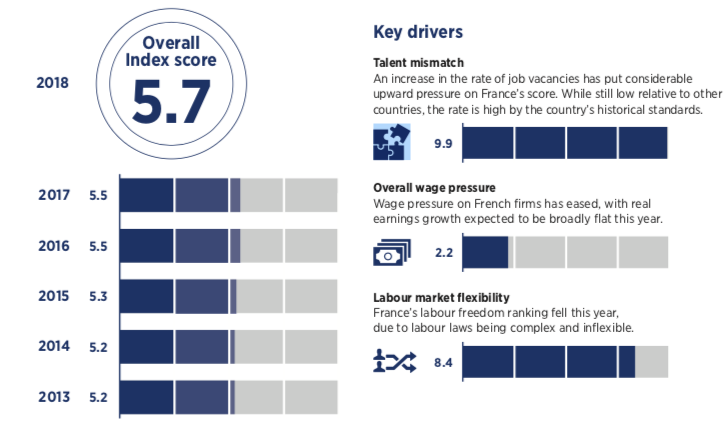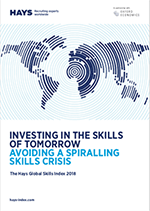Hays Skills Index: France
Hays Global Sklls Index shows France to have high unemployment and inceasing job vacancies, showing a talent mismatch. Labour reforms aim to simplify employment taxes to increase employment.

 In 2017, GDP increased by 2.3%. It has slowed markedly in the first half of 2018, reflecting the impact of higher taxes and inflation on consumer purchasing power, and a drop-off in exceptional items such as aircraft sales.Total employment rose by 1.1% in 2017. This impacted joblessness, with the headline rate falling to 9.4%. It had remained stubbornly above the 10% mark between 2013 and 2016. However, it remains among the highest rates in Western Europe. Unemployment is particularly prevalent for the young and low-skilled workers.At the same time as unemployment remains high, the number of vacancies increased. Total vacancies stood 10% higher in 2017 than a year earlier. This is suggestive of talent mismatch.
In 2017, GDP increased by 2.3%. It has slowed markedly in the first half of 2018, reflecting the impact of higher taxes and inflation on consumer purchasing power, and a drop-off in exceptional items such as aircraft sales.Total employment rose by 1.1% in 2017. This impacted joblessness, with the headline rate falling to 9.4%. It had remained stubbornly above the 10% mark between 2013 and 2016. However, it remains among the highest rates in Western Europe. Unemployment is particularly prevalent for the young and low-skilled workers.At the same time as unemployment remains high, the number of vacancies increased. Total vacancies stood 10% higher in 2017 than a year earlier. This is suggestive of talent mismatch.
French employment skills - view from the ground
Economic growth is expected to return to a solid pace of close to 2% over 2018-19 thanks to strong external demand and robust business confidence. Lower labour taxes and labour market reforms should encourage job creation. Inflation is projected to pick up, supported by the strengthening of the economy and an increase in wages. Employment growth proved very strong in 2017 with an extra 300,000 jobs being created. However, it should slow slightly over the next two years with an expected net total of 200,000 extra jobs in 2018. This will be fuelled by the recent changes to the CICE (Tax Credit for Competitiveness and Employment), as the cut to social contributions will likely lead to further job creation as businesses have a lower cost to pay. The unemployment rate is on a downwards trend and should fall from 9.2% in the first quarter of 2018 to 8.2% at the end of 2020, reaching its lowest level since the end of 2008.Tina Ling, Managing Director, Hays France & BeneluxKey skills in demand
- DevOps Engineers
- Java Developers
- Biostatisticians
- Tax Specialists
- Construction Engineers
Click here to browse and download the Hays' Global Skills Index 2018 on their website.

©2025 Re:locate magazine, published by Profile Locations, Spray Hill, Hastings Road, Lamberhurst, Kent TN3 8JB. All rights reserved. This publication (or any part thereof) may not be reproduced in any form without the prior written permission of Profile Locations. Profile Locations accepts no liability for the accuracy of the contents or any opinions expressed herein.


































